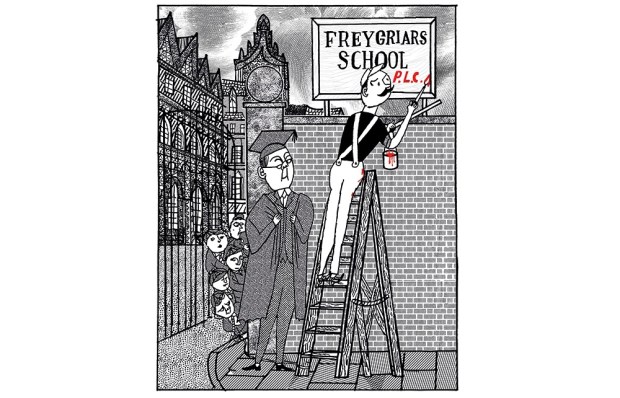Fawning over China
Sir: In reading your recent leading article on Huawei (‘Red-handed’, 2 February), I feel I should point out that it is not solely the British government who have been wrong-footed by the rise of China.
Here in Canada, Prime Minister Trudeau has long desired to open up Canadian markets to Chinese companies, going so far as to express admiration for the country’s ‘basic dictatorship’. The Chinese press even bequeathed him with
a charming nickname: the Little Potato.
Now, in the face of the Huawei charges, Mr Potato has been forced to change course and has fired his ambassador, John McCallum, after he defended Huawei’s Chinese executives rather than supporting Canadians who have recently been imprisoned in China. Someone apparently forgot to rewrite his script.
Malcolm Coady
St John’s, Canada
Troubles ahead?
Sir: Matthew Parris seems to display a disturbingly one-eyed view of Brexit (‘Those who warn of Brexit unrest invite it’, 2 February). He condemns as ‘desperate stuff’ the warnings of a few British politicians and pundits about potential voter disillusionment and civic instability if parliament fails to honour the result of the 2016 referendum. Yet he says nothing about the pernicious pronouncements of those trying to derail or dilute Brexit who have been invoking the sinister spectre of renewed Irish terrorism. Diehard Remainer MPs and pundits, Brussels and, worst of all, the Taoiseach himself have been piling in to talk up the risk of a return to the Troubles to try to frighten the UK into submitting to the fatuous proposed Irish border backstop mechanism. That is what I would call desperate stuff. As Lionel Shriver puts it in her own excellent piece on the subject, in the same issue, ‘when you use terrorists to advance your own purposes, are you not also a terrorist yourself?’
Nigel Henson
Farningham, Kent
The independent sector
Sir: Those who write about independent education rarely manage to stray beyond the 200-odd establishments they love to pillory as public schools, an antiquated term long since abandoned by all save their critics. This is perhaps because they have usually been educated at such places, or have taught in them. Alex Renton, like the books he reviews, presents a caricature of independent schools as a whole by repeating well-worn charges against the well-publicised few with their ‘faux-Gothic spires’ (‘Old school ties can’t last forever’, 2 February).
The Independent Schools Council has some 1,300 members, varying in size from 50 to 1,700 pupils. Few possess lavishly equipped theatres or vast playing fields. Just 68 have top-class athletic tracks. Most of them stand at the heart of the local communities from which their students mainly come, and work closely with their neighbouring state schools which often share their (usually limited) facilities. Half of them are non-selective. Fees vary greatly, with an average gap of some £2,000 per term between schools in the north and south of the country. More than a third of families pay reduced fees. Parents are well aware that diversity and openness are the independent sector’s most striking characteristics today. Will commentators with their obsessions about exclusivity ever wake up to reality?
Alistair Lexden
General Secretary, Independent Schools Council 1997-2004
House of Lords, London SW1
Joys of induction
Sir: This is not a topic I ever expected to discuss in public but Ysenda Maxtone Graham’s assault on one of the finest pieces of kitchen equipment I own needs to be addressed (‘Old flame’, 2 February).
Doing the science bit first, she confuses how they work with how a microwave works. If she thinks it is the food heating the saucepan I invite her to experiment. Put an empty saucepan on an induction hob and see what happens.
Continuing the science bit: energy is transferred through magnetic rather than heat transfer, hence the need for special pots and pans. Because of the method of heat transfer, induction is as responsive as gas but without the potential for creating fires. Nor does it consume oxygen and nor can it kill you through carbon monoxide poisoning. It is as locally clean to use as all other electric methods and, being a flat surface, is easy to keep clean.
But the key piece of information is that because it does not use heat transfer to cook, it is reasonably safe post-cooking. Heat rises. Fry an egg, remove the frying pan, and within seconds the cooking zone is safe, if not comfortable, to touch. Don’t try that on halogen, or conventional electric. I rest my case.
Gerry Gavigan
London SW11
Still burning
Sir: I’m delighted to read the support for gas cookers by Ysenda Maxtone Graham. Our six-ring cast-iron ‘Alpine New World’, circa 1936, fits snugly in our contemporary kitchen and serves us well. Some lucky grandchild will inherit it eventually.
Martin Bloomfield
Kingston, Surrey
Gongs for taxpayers
Sir: I find Martin Vander Weyer’s contention that the super-rich who pay their taxes should be saluted and rewarded baffling (Any Other Business, 2 February). I am no raving socialist; I do not resent these people their financial good fortune, and accept the reality that if the super-rich wish to avoid the paying of taxes, they can. But it is a stretch to suggest that somehow those who do stay and pay should be given gongs and titles. How we encourage the super-rich to do what they should when it comes to paying tax, I do not know. But I do know that rewarding them for doing it is not the answer.
Evan Byrne
London N4
Got something to add? Join the discussion and comment below.
Get 10 issues for just $10
Subscribe to The Spectator Australia today for the next 10 magazine issues, plus full online access, for just $10.
You might disagree with half of it, but you’ll enjoy reading all of it. Try your first month for free, then just $2 a week for the remainder of your first year.













Comments
Don't miss out
Join the conversation with other Spectator Australia readers. Subscribe to leave a comment.
SUBSCRIBEAlready a subscriber? Log in